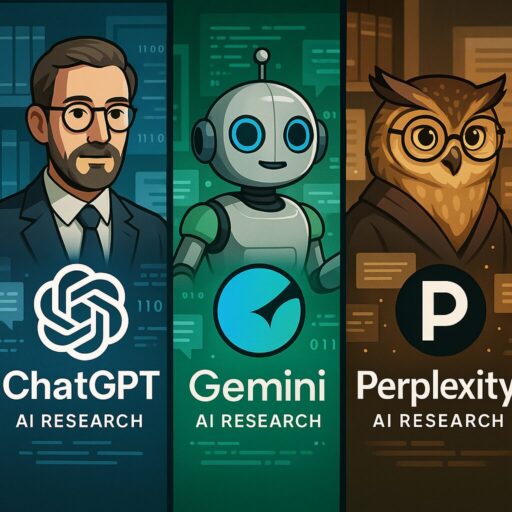Remember when research meant hours in libraries or endless browser tabs? Those days are fading fast. AI-powered deep research tools are revolutionizing how we gather and synthesize information, functioning as virtual research assistants that can produce comprehensive reports in minutes instead of hours. But with multiple options available, which one deserves your time and possibly your subscription dollars?
The Rise of AI Deep Research Tools
The latest iterations of AI chatbots from OpenAI, Google, and Perplexity AI have evolved beyond simple question-answering into sophisticated research assistants. These deep research features combine large language models with real-time web searching capabilities and advanced reasoning to deliver comprehensive reports on complex topics.
Unlike standard chatbot interactions, deep research queries typically take between 5-30 minutes to complete (with most everyday queries resolving in 5-10 minutes), as the AI methodically searches the web, analyzes information, and compiles findings into cohesive reports that might otherwise take you hours to create manually.
How These Tools Work Behind the Scenes
When you submit a deep research request, here’s what typically happens:
- The AI employs a reasoning model to fully understand your query
- It may ask clarifying questions to narrow the scope
- It creates a research plan (some platforms let you edit this plan)
- It conducts multiple web searches and analyzes the documents it finds
- It synthesizes everything into a detailed, structured report
Most platforms allow you to watch this process unfold in real-time through a sidebar or separate tab, giving you insight into how the AI is searching and what sources it’s consulting.
When Deep Research Tools Truly Shine
These tools aren’t meant to replace simple Google searches. They excel when:
- You’re struggling to find specific information through conventional search methods
- You need to synthesize information from multiple sources but lack the time to read dozens of articles
- You’re researching specialized or technical topics where having context matters
- You need comprehensive information on a subject without knowing exactly what specific questions to ask
Real-world applications range from finding obscure product parts (“What’s the replacement sensor part number for my 2018 refrigerator model XYZ?”) to researching investment opportunities (“What’s the financial outlook for Company X over the next year?”) to learning about niche topics (“What’s involved in learning to play the handpan instrument?”).
Free vs. Paid: What You Get
All three major platforms offer free access to their deep research features, but with different limitations:
Perplexity
Currently offering the most generous free tier, Perplexity uses a daily limit system that allows approximately 3 deep research queries per day. The free reports match the quality of the paid version, which costs $20/month for unlimited access.
Gemini (Google)
Free users get 5 searches per month, while Gemini Advanced subscribers ($20/month) receive 20 reports monthly. The integration with Google’s ecosystem provides unique advantages for those already invested in that environment.
ChatGPT (OpenAI)
Free users receive 5 monthly searches using a lightweight research model. ChatGPT Plus subscribers ($20/month) get 10 queries with the full-featured model and 15 with the lightweight version.
Platform Face-Off: Strengths and Weaknesses
ChatGPT: The Focused Researcher
Strengths:
- Produces the most direct and robust reports that stay closely aligned with your specific query
- Information is concise and well-organized
- Always asks follow-up questions to refine its understanding
- Excellent at distilling complex topics into accessible explanations
Weaknesses:
- Not as effective at finding specific shopping links or product information
- The follow-up questions, while helpful, can slow down the initial research process
Gemini: The Thorough Scholar
Strengths:
- Allows you to edit the research plan before execution
- Seamless integration with Google products and search results
- Can leverage your browsing history for personalization (if permitted)
- Audio Overviews feature provides podcast-style summaries of reports
Weaknesses:
- Reports tend to be more verbose and sometimes cover topics beyond the scope of the original query
- The additional context can be overwhelming for straightforward questions
Perplexity: The Speedy Assistant
Strengths:
- Significantly faster results (sometimes in just 2 minutes)
- Excels at finding shopping links and product information
- One-click operation with no follow-up questions to slow the process
- Clean, straightforward interface
Weaknesses:
- Reports sometimes lack the depth found in ChatGPT and Gemini
- The lack of clarifying questions can occasionally lead to less precise results
Making Your Choice: Which Platform Is Right for You?
The “best” deep research tool depends entirely on your specific needs:
ChatGPT is ideal if: You want thorough but concise reports that focus precisely on what you asked. Its ability to cut through noise and deliver exactly what you need makes it perfect for technical or academic research.
Gemini shines when: You need highly detailed reports with broad contextual information and don’t mind some additional verbosity. It’s particularly valuable if you’re already embedded in the Google ecosystem and appreciate the cross-platform integration.
Perplexity is the go-to if: Speed is your priority or if your research frequently involves finding products or services. When you need answers quickly without much back-and-forth, Perplexity delivers.
In my testing across various scenarios, I’ve found that having access to at least two of these platforms provides the best coverage for different types of research needs. The free tiers collectively offer enough functionality for occasional personal research, while power users will likely want to subscribe to their preferred platform.
Beyond the Basics: Maximizing Your Research Experience
Regardless of which platform you choose, here are some tips to get the most out of your AI research assistant:
- Be specific in your queries – The more detailed your request, the more targeted the results
- Review the sources – Always check the citations provided to verify critical information
- Use the edit feature – If the platform allows editing the research plan, take advantage of this to guide the AI’s focus
- Save important reports – These platforms typically limit how long reports remain accessible, so export or save important findings
As we enter this new era of AI-assisted research, these tools represent just the beginning. The underlying models and search capabilities will continue to improve, and we can expect features like real-time data analysis, integration with specialized databases, and even more personalized research experiences in the near future.
Have you tried any of these deep research tools? Which one works best for your needs, and what kinds of questions have you found them most helpful for answering? Share your experiences in the comments below!
Footnotes
[1] How to Choose Between ChatGPT, Gemini, Perplexity Deep Research Tools – Lifehacker
[2] Comparing Leading AI Deep Research Tools – ByteBridge
[3] Is Deep Research Useful? Comparing Gemini vs ChatGPT vs Perplexity – Bind Blog
[4] I Just Tested AI Deep Research: Grok 3 vs Perplexity vs Gemini – Tom’s Guide


